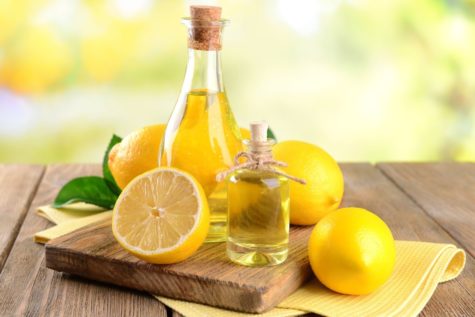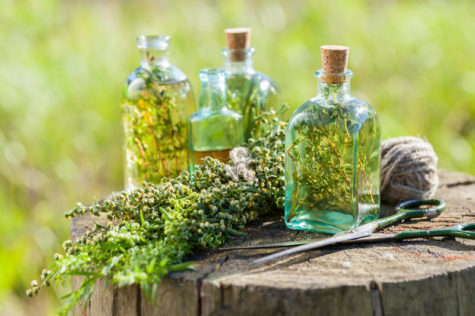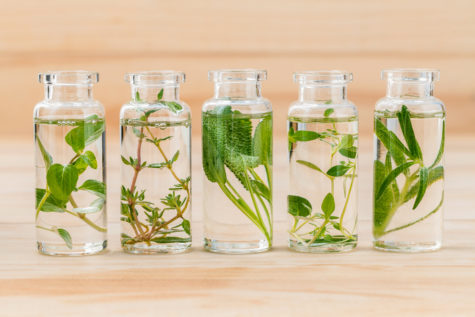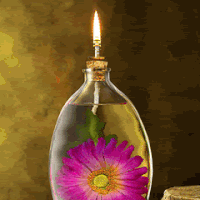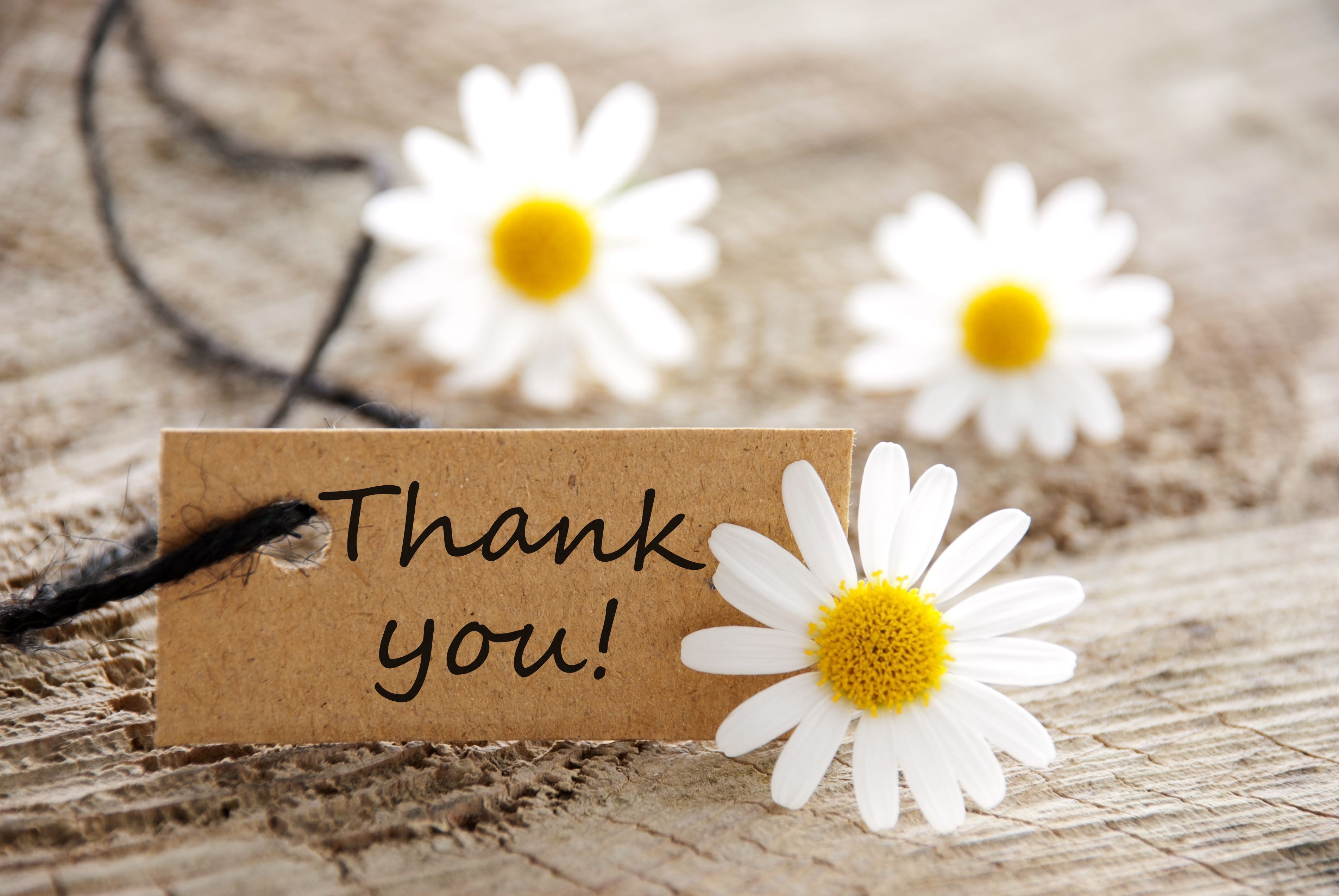Infusion
Make Your Own Lemon Oil
It’s not difficult to make your own Lemon Oil. These simple recipes use the cold process method. Because this method does not use heat the enzymes and micronutrients are better preserved, but the Lemon oil you make will not be as strong as the distilled Lemon essential oil that you might purchase.
Recipe #1
Ingredients
- 1 lemon
- Cold-pressed olive oil
Directions
Grate the outside of the lemon over a bowl. Fill a small glass bottle halfway with the grated lemon zest. Fill the rest of the bottle with olive oil. Set the bottle on a windowsill or somewhere else that gets a lot of sun.
Leave it there for a few days, but shake the bottle a few times per day. Store lemon oil in an airtight container at room temperature.
Recipe #2
Ingredients
- Lemons
- Coconut Oil
Directions
Wash and dry lemons. Using a vegetable peeler, cut thin slivers of the yellow skin in long ribbons. (Or if you have a zester, use that!) Make sure not to peel off the bitter white pith, just the outside will do. Pack peels tightly in a jar, then pour in just enough coconut oil to cover.
Place in a sunny window for 1-2 weeks, shaking every day. Strain peels and pour oil into a jar. Store in a dark cabinet or the fridge.
Recipe #3
I prefer an olive oil infusion for salads, but because it’s so vulnerable to oxidation via sunlight I let mine “steep” longer in a dark cabinet to attains its distinct flavor. Like the cold process coconut oil version, this method preserves enzymes and micronutrients.
Ingredients
- Lemons
- Olive Oil
Directions
Wash and dry lemons. Using a vegetable peeler, cut thin slivers of the yellow skin in long ribbons. (Or if you have a zester, use that!) Make sure not to peel off the bitter white pith, just the outside will do. Pack peels snugly in a jar, then pour in just enough olive oil to cover. Seal tightly and place in a dark cabinet for 1-2 months, shaking every few days.
Strain peels and pour oil into a jar. Store in a dark cabinet or the fridge.
Sources:
How to Make Your Own Essential Oils
Making your own pure essential oils at home involves a distilling process and this means purchasing or building your own still! While it is possible to make your own still from various items around the home, it may be safer to purchase a home still from an online store. Something like one of these alcohol stills on Amazon will set you back over a hundred dollars, but could be viewed as a nice investment.
Having said that, if you intend to build a home still, you can find the parts you need in a home-brew store or the specialist section in a hardware store. For in-depth directions, I would advise that you take a look at this book on Amazon The Secrets of Building an Alcohol Producing Still.
As a beginner we recommend that you start with an alternative and more traditional oil infusion process. An oil infusion will give you very nice fragrant results, and although not as strong as distilled essential oil you can vary the strength for your needs, and you will not need to dilute.
The key to making good oil infusions is choosing the right materials. You’ll need to use pale colored oil that has a mild scent that won’t overpower the flowers, herbs or spices you intend to use with it. Olive oil, jojoba oil, safflower oil, almond oil or canola oil can often work very well.
-
Choosing Herbs
You can use almost any garden herb when you make your own essential oil. You should use the leaves and flowers, but avoid using any woody stems or branches. Always chop the leaves to release their scent before you add them to the oil. The most popular are Lavender, Rosemary, Peppermint, Thyme and Lemon Balm.
-
Choosing Spices
Perhaps the most common spices found in essential oils are the most aromatic. The most popular seem to be Cinnamon, Coriander, Cumin, Nutmeg and Cloves. You will need to crush the spices to release their aromas fully before adding them to your oils with a mortar and pestle.
-
Choosing Flowers
Scented flowers are very popular additions into many homemade essential oils. You can decide to use one or a combination of flowers in your own oils. Be sure you use the petals only as these hold much of the fragrance you want.
Cut the flowers while they are still not completely opened and remove the petals for use in your oils. Most fragrant flowers are fine to use in essential oil, such as Roses, Carnations, Frangipani, Hyacinth, Lavender, Violets, Marigolds and plenty of others.
Important Points
Now, when you make your own essential oil there are a few things to keep in mind:
- The plant material you use must be clean and free of pesticides, herbicides, fungicides, and other chemicals.
- The final product will not be as potent as essential oils you can purchase.
- You can use fresh or dried plant material.
- You can use herbs, spices, flower petals, or citrus fruit rinds.
- Always store infused and essential oils in dark, glass containers in a cool, dark place.
Extraction and Infusion Methods:
These are all primitive methods of distilling or extracting the oil out of the plant material. The heat used in the distilling methods below will damage the essential oil and will lessen some of the benefits from the essential oils. Also, the oils obtained from the extraction methods below will not be 100% pure.
The methods are listed in order of the quality of essential oil you’ll get (best first).
-
Method #1
Place plant material into a crock pot filled with distilled water. Cook on low for 24 hours. Leave crock pot open and allow it to sit for a week. Collect the oil off the surface of the water and put it into a dark, glass container. Cover with a piece of cloth and allow it to sit for a week to evaporate off any extra water. It will last for about 12 months.
-
Method #2
Place ground up plant material in a cotton or linen bag. Tie it shut and place it in a pot of distilled water. Bring water to a boil and simmer slowly for 24 hours. Collect the oil off the surface of the water (you may have to squeeze the bag) and put it into a dark, glass container. Cover with a piece of cloth and allow it to sit for a week to evaporate off any extra water. It will last for about 12 months.
-
Method #3
Half-fill a large glass bottle with olive oil (or almond, jojoba, or rapeseed). Cram as much plant material as possible into the bottle. Cap it and let it sit in a cool, dark place for 24 hours. Shake it. After three days strain it through cheese cloth and put liquid in a dark, glass container. (If scent is not strong enough add more plant material and repeat process.) It will last for about 6 months.
-
Method #4
Stir 1/2 ounce of plant material into 2 cups olive oil (or almond, jojoba, or rapeseed). Cook in crock pot on low for about 6 hours. Strain the mixture with unbleached cheese cloth and put liquid in a dark, glass container. It will last for about 6 months.
-
Method #5
Place 1 Tablespoon ground up plant material, 1/2 cup of olive oil (or almond, jojoba, or rapeseed), and 1/2 teaspoon of white vinegar into a small bottle (cap on). Put it in a warm place (sunny window) for three weeks. Shake it well twice a day. Strain the mixture with unbleached cheese cloth and put liquid in a dark, glass container. It will last for about 6 months.
-
Method #6
Soak plant material in a bottle of rubbing alcohol for two weeks (cap on). Pour it out into a wide container. Allow alcohol to evaporate. Collect the oil left in the container and put it into a dark, glass container. It will last for about 6 months. Please note that this method should NOT be consumed.
Have fun making your own essential oils!
Found at:
